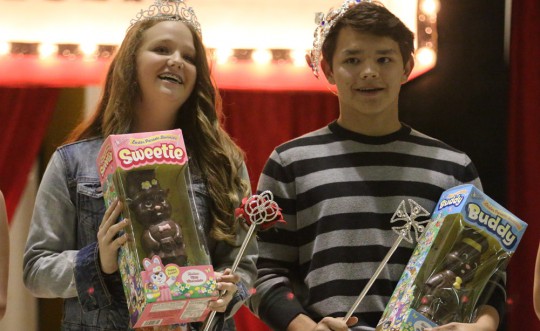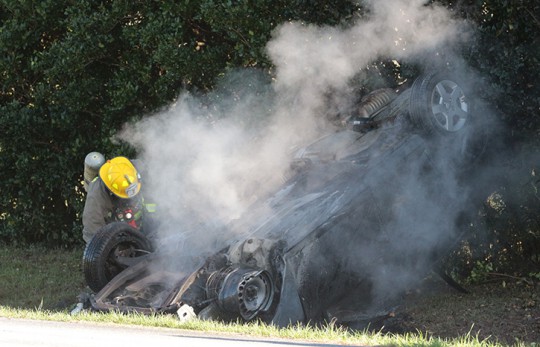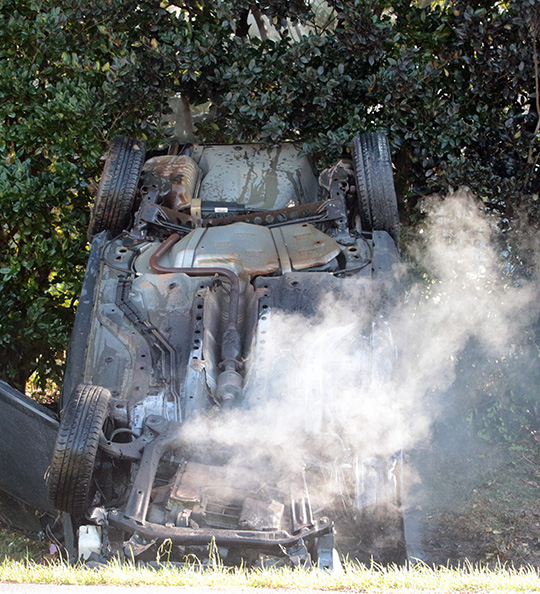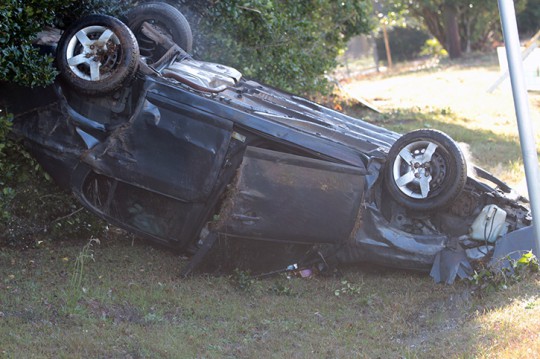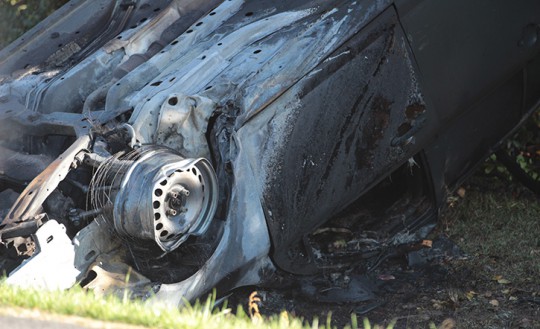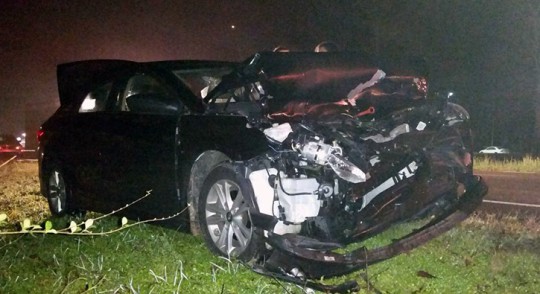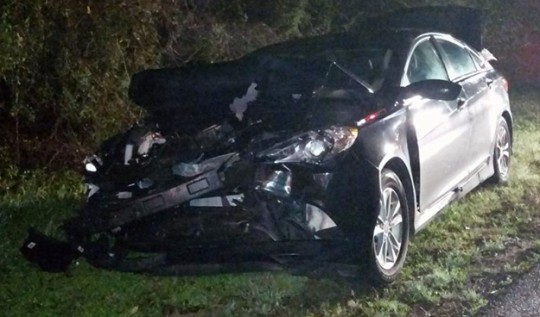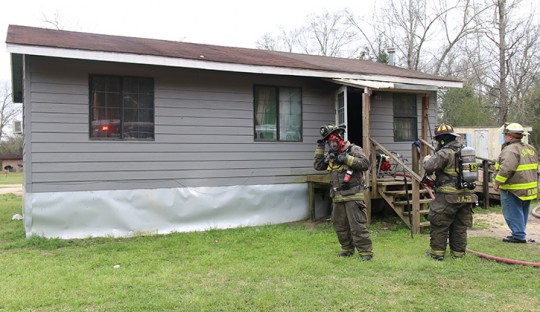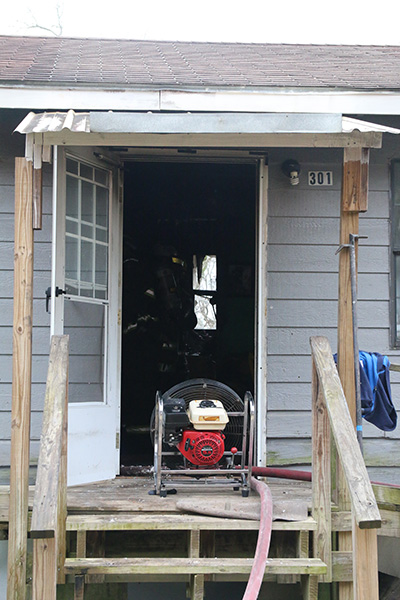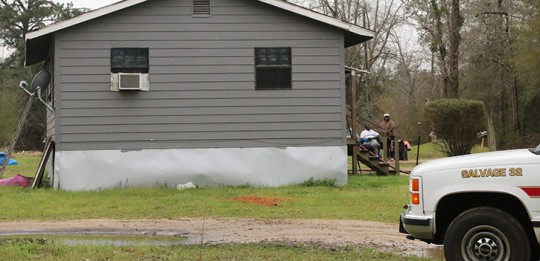Jay, Northview Students Picked For Washington Youth Tour
March 14, 2016
 Rebecca Boutwell of Jay High School and Zipporah Harris of Northview High School have been name winners of the Escambia River Electric Cooperative 2016 Youth Tour to Washington contest.
Rebecca Boutwell of Jay High School and Zipporah Harris of Northview High School have been name winners of the Escambia River Electric Cooperative 2016 Youth Tour to Washington contest.
Judges from PowerSouth Energy Cooperative in Andalusia, AL, and Southern Pine Electric Cooperative in Brewton, AL, scored contestants in their interviews based on their knowledge of Escambia River Electric Cooperative and the history of rural electrification. Personal attributes of each candidate such as character, academic ability, personality and leadership skills were also considered.
Britt and Wiggins will represent EREC on the Washington Youth Tour in June. They will also have the chance to see the sites, learn about the nation’s capital, rural electrification and more.
Ernest Ward Names Spring King And Queen
March 14, 2016
Ernest Ward Middle School held a Spring Dance Friday night, naming a queen and her court based upon student votes.
King Colton Dockens and Queen Cloe Smith reigned over the dance, along with their court: Sixth Grade Knight Jace Gifford, Sixth Grade Maiden Shelby Rice, Seventh Grade Knight Jonathan Windham and Seventh Grade Maiden Mary Paige Nasser.
Pictured top: Ernest Ward Middle Spring Dance Queen Cloe Smith and King Colton Dockens. NorthEscambia.com photo, click to enlarge.
No Injuries In Fiery Highway 97 Rollover Crash
March 13, 2016
There were no injuries in a fiery rollover crash on Highway 97 in Molino Sunday morning.
The female driver of a northbound car lost control just north of Gibson Road, ran into the ditch, hit a culvert and went airborne before her vehicle came to rest upside down in a ditch about 8:50 a.m.. The driver, who was wearing a seat belt, was able to crawl out of the vehicle before it became engulfed in flames. There were no passengers in the vehicle.
The driver refused transport to the hospital.
The accident remains under investigation by the Florida Highway Patrol. Further details, including the name of the driver, have not yet been released.
The Molino Station of Escambia Fire Rescue and Atmore Ambulance also responded to the crash.
Pictured top: A volunteer firefighter checks a still smoldering car for additional victims following a single vehicle rollover crash on Highway 97 in Molino Sunday morning. Pictured inset and below: There were no injuries in the crash. NorthEscambia.com photos, click to enlarge.
One Injured In Early Morning Highway 29 Crash
March 13, 2016
One person was injured in a tw0-vehicle crash early Sunday morning on Highway 29.
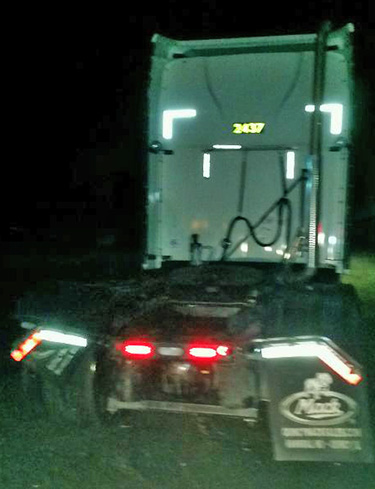 The accident occurred about 3:35 a.m. st Tate School Road. One victim was transported to an area hospital by ambulance with injuries that were not considered to be life threatening.
The accident occurred about 3:35 a.m. st Tate School Road. One victim was transported to an area hospital by ambulance with injuries that were not considered to be life threatening.
The cause of the accident remains under investigation by the Florida Highway Patrol. Further details, including the names of those involved, have not yet been released.
The Cantonment Station of Escambia Fire Rescue also responded to the crash.
NorthEscambia.com photos by Kristi Price, click to enlarge.
Family Homeless After Century Fire
March 13, 2016
A Century family was left without a home following a house fire Saturday afternoon.
The house in the 300 block of Backwoods Road, just off Highway 4A, was left unlivable by the blaze. The American Red Cross was called to assist the occupant and a child with temporary housing.
Neighbors had reportedly broken back windows on the home and pulled a garden house inside in an attempt to knock down the fire before firefighters arrived and quickly extinguished the blaze. There were no injuries reported.
The exact case of the blaze was not immediately known.
The Century, McDavid and Walnut Hill stations of Escambia Fire Rescue, the Jay Fire Department and the Flomaton Fire Department were dispatched to the fire, along with Escambia County EMS and the Escambia County Sheriff’s Office.
NorthEscambia.com photos, click to enlarge.
Sunny, Near 80 Today
March 13, 2016
Here is your official NorthEscambia area forecast:
Sunday: Mostly sunny, with a high near 80. South wind 5 to 10 mph becoming west in the afternoon.
Sunday Night: Partly cloudy, with a low around 58. South wind 5 to 10 mph.
Monday: Partly sunny, then gradually becoming sunny, with a high near 81. Southwest wind around 10 mph.
Monday Night: Mostly clear, with a low around 57. Southwest wind 5 to 10 mph.
Tuesday: Sunny, with a high near 79. South wind 5 to 10 mph.
Tuesday Night: Partly cloudy, with a low around 58. Southwest wind 5 to 10 mph.
Wednesday: A 20 percent chance of showers and thunderstorms. Partly sunny, with a high near 78. Southwest wind 5 to 10 mph.
Wednesday Night: A 40 percent chance of showers and thunderstorms. Mostly cloudy, with a low around 60. South wind around 5 mph becoming northwest after midnight.
Thursday: A 30 percent chance of showers and thunderstorms. Partly sunny, with a high near 73.
Thursday Night: A 30 percent chance of showers and thunderstorms. Mostly cloudy, with a low around 53.
Friday: A 40 percent chance of showers and thunderstorms. Partly sunny, with a high near 67.
Friday Night: A 30 percent chance of showers and thunderstorms. Mostly cloudy, with a low around 50.
Saturday: A 40 percent chance of showers and thunderstorms. Partly sunny, with a high near 68.
Deadline For Escambia Storm Debris Pickup Is Today
March 13, 2016
Escambia County and Emerald Coast Utilities Authority (ECUA) crews will begin making their final passes through neighborhoods collecting storm generated debris this week. Residents in the unincorporated areas of Escambia County that have storm related debris are asked to move all debris to the right of way no later than Sunday, March 13.
When moving your debris curbside, please remember:
- All storm generated debris must be separated and be placed in the right-of-way. Residents should avoid placing debris near power poles, fire hydrants, water meters, mail boxes or other utilities. Crews are not allowed on private property so all debris must be in the right-of-way area, typically the area from a power pole to the curb.
- No demolition debris will be picked up, please consult with your insurance company and/or contractor for demolition debris removal.
- Do not place household garbage with storm debris.
- Storm generated debris must be sorted and placed curbside in the following categories:
- Construction– furniture, carpet, tile, steel, glass, brick, concrete, asphalt roofing material, pipe, gypsum wallboard, lumber or anything used in the construction, renovation, and demolition of a structure.
- Vegetative debris – Tree limbs, leaves, logs, pallets, and tree branches
- White goods – washers, dryers, refrigerators, ranges, microwaves, water heaters, freezers and small AC units.
- Electronics – TV’s, computers, monitors, fax machines, stereos, speakers, etc.
- Household Hazardous Waste (HHW) – Cleaning supplies, batteries, lawn chemicals, oils, oil-based paints and stains and pesticides.
Commercial Customers please contact your contracted waste services provider for disposal services. Commercial waste should not be placed on the right-of-way.
Residents of Century should continue to place their storm debris on the right of way for continued pickup. Vegetative debris should be separated from construction debris.
Gambling Decision In Judges’ Hands After Lawmakers Fold
March 13, 2016
Lawmakers called it a heavy lift, a three-dimensional game of chess and a Rubik’s cube.
Whatever the label, a comprehensive gambling plan that would have authorized a $3 billion deal between Gov. Rick Scott and the Seminole Tribe proved too arduous a task for the Legislature to complete this session.
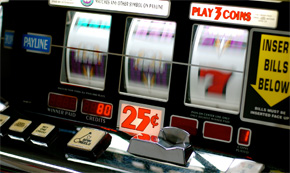 But the face of gambling in Florida could undergo major changes before lawmakers meet again next spring, as a result of decisions coming not from policy makers but from the courts.
But the face of gambling in Florida could undergo major changes before lawmakers meet again next spring, as a result of decisions coming not from policy makers but from the courts.
In one of two gambling-related lawsuits, the Seminoles are alleging that the state breached a 2009 agreement that gave the tribe exclusive rights to operate banked card games, such as blackjack, at most of its casinos. If a federal judge agrees with the tribe, Florida stands to lose hundreds of millions of dollars each year in revenue the Seminoles now shares with the state.
The stakes are even higher in another case pending before the Florida Supreme Court that could open the door for slot machines at pari-mutuels throughout the state. That lawsuit could also cost the state money gleaned from the Seminoles.
Gretna Racing filed the lawsuit after Florida gambling regulators refused to allow the tiny horse track west of Tallahassee to add slot machines to its operations. The Gadsden County track contends that it should be allowed to have the lucrative slots because local voters approved them, but the state insists that only the Legislature has the authority to sign off on the games.
Making matters even more complicated, former Gov. Bob Graham, who was allowed to file a friend-of-the-court brief in the case, believes that the addition of slot machines at any pari-mutuel outside Miami-Dade or Broward counties requires approval from voters statewide. Statewide referendums require 60 percent approval from voters for passage.
The Supreme Court late last year accepted jurisdiction in the Gretna Racing case after a split appellate court reversed an earlier decision and ruled against the pari-mutuel.
In both decisions, the appellate judges asked the Florida Supreme Court to weigh in on the issue of whether pari-mutuels can have slot machines if local voters approve, or if the games require the express say-so of the Legislature.
The Supreme Court’s ruling will likely affect gambling operations in Gadsden and at least five other counties — Brevard, Hamilton, Lee, Palm Beach and Washington — where voters have also approved referendums authorizing slots at local pari-mutuels. State regulators have denied applications for slots in four counties, and the Palm Beach Kennel Club, which was appealing its slots rejection when the Supreme Court decided to take the Gretna case, has joined the lawsuit.
A decision from the court agreeing with Gretna would affect another component of the 2009 agreement, called a “compact,” between the state and the Seminoles. The 20-year deal, finalized in 2010, gave the tribe exclusive rights to operate slot machines, outside of pari-mutuels in Broward and Miami-Dade counties. The state reaps about $120 million a year from the revenue-sharing agreement.
“If they rule in a way that resulted in slots being granted to Gretna and potentially being granted to other places, it makes it more difficult to unwind and to un-ring that bell, legislatively,” said Sen. Rob Bradley, a Fleming Island Republican who worked with Rep. Jose Felix Diaz as the Legislature’s chief negotiators in talks with the Seminoles and Scott’s administration over the past year.
The state and the tribe were trying to come up with a new compact after a portion of the 2009 agreement dealing with the banked card games expired last summer, prompting the Seminoles to file the federal lawsuit.
Scott and the Seminoles signed a proposed compact in December that would have allowed the tribe to add roulette and craps — and keep banked card games and slots — to its casino operations. In exchange, the Seminoles agreed to pay the state a minimum of $3 billion over seven years in a 20-year compact that would have netted Florida about $9 billion over the life of the contract. The tribe also signed off on slots for the Palm Beach Kennel Club and at a new facility in Miami-Dade County.
A House committee gave preliminary approval to a measure that would have authorized the compact and allowed slots in Palm Beach County and at the new Miami-Dade facility. But a Senate committee agreed to a much more expansive bill that would have permitted slots in at least five counties.
Sen. Joe Negron, who takes over as Senate president after the November elections, backed the effort to expand the Senate proposal, crafted by Bradley. Negron insisted that, without his proposed expansion, the Senate Regulated Industries Committee would never have approved Bradley’s plan. The committee signed off on Negron’s proposal, but that was as far as it went.
Negron, R-Stuart, said he plans to make approval of a new compact a priority after he becomes president.
“It’s important for us to have predictability and certainty in the gaming industry in Florida,” Negron said. “I would love to be able to use the additional revenue that would come from the Seminole compact to fund some of the higher-education priorities that I have. … I don’t understand why people say it’s so complicated. It’s not. It can be done.”
Although they did not reach consensus this year, Diaz said lawmakers’ reactions to the gambling proposals were instructive for future attempts at resolving the issue.
“At least we know now, having gone through session and seen all the changes that were attempted, what many of the legislators want out of the gaming compact, so we’re in a stronger place to negotiate,” Diaz, R-Miami, said.
Federal law requires that tribes have “exclusivity” regarding some aspect of gambling in order to justify state revenue-sharing agreements, which must be approved by the U.S. Department of the Interior, something that appears to have been lost on many state legislators.
“I don’t think the members truly understand just how much leverage the Seminole Tribe has. I don’t think the membership truly understands just how complicated federal Indian gaming law is … and how everything that we do here has to be approved by the federal government,” Diaz said.
In its lawsuit against the state, the Seminoles are accusing state regulators of breaching the exclusivity portion of the compact by authorizing “player-banked” card games at pari-mutuels throughout Florida. In those games, players bet against each other instead of the “house.”
But even if lawmakers, or regulators, ban the player-banked games, the Seminoles would still be entitled to keep operating them, according to the tribe’s lawyer, Barry Richard.
“Once it’s authorized, then we have the right to it and that’s the end of the story. They can’t just yo-yo us that way,” he said.
The lawsuit also accuses the state of acting in “bad faith” in negotiations regarding the banked card games because, instead of focusing on the card-related portion of the deal, the state forced the Seminoles to rework the entire 20-year agreement, Richard said.
“They would not negotiate the card games unless it was tied to the whole big enchilada, and that was tied to pleasing the pari-mutuels. And, in my opinion, that’s not good faith,” Richard said. “The rest of the compact is set in stone until 2030…The parties together can mutually change that. But they can’t say the only way we’re going to negotiate the renewal of the card games is if you agree to give us more money on the rest of it. That’s not good faith.”
Early Voting Ends With 14K Ballots Cast; Turnout At 21% So Far
March 13, 2016
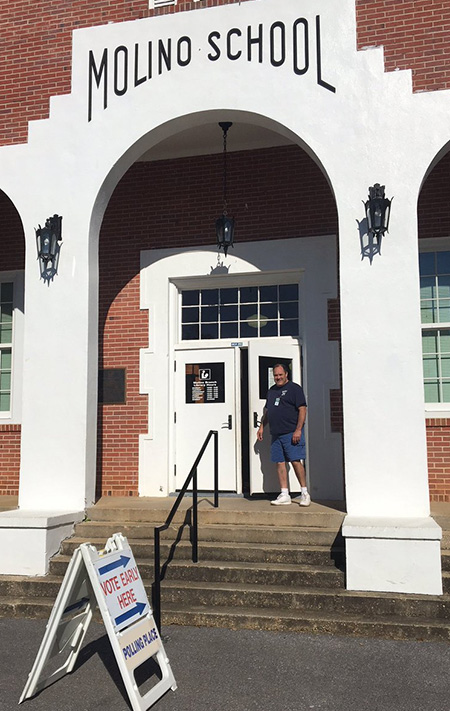 Early voting for the March 15 Presidential Preference Primary Election with a final unofficial turnout of 14,150, a 59 percent increase over the 2008 presidential preference primary and an 82 percent increase over 2012.
Early voting for the March 15 Presidential Preference Primary Election with a final unofficial turnout of 14,150, a 59 percent increase over the 2008 presidential preference primary and an 82 percent increase over 2012.
Absentee and early voting turnout combined equal a 21 percent voter turnout so far.
The number of ballots cast at each early voting location were as follows:
SOE Office – 1561
Main Libraary – 1635
Genealogy Library – 3915
Bellview (5 Flags) - 1143
Southwest -2582
Extension Office – 2403
Molino – 911
Pictured: The early voting location at the Molino Community Center. File photo.
Florida Gov’t Weekly Roundup: Let’s Go Home For Good This Time
March 13, 2016
As the 2016 legislative session came to a blessedly peaceful end Friday night, you could look at the 60-day assembly through a variety of prisms.
For House and Senate Republican leaders, it was an election-year opportunity to show that they could govern after the messy unraveling of last year’s session, which ended with bruised egos and a lengthy list of unfinished priorities.
 And while Gov. Rick Scott tried to put a brave face on the outcome of “a good session,” he did so among the wreckage of his legislative priorities — his tax-cut package gutted, his call for $250 million in economic-development incentives ignored and his choice for surgeon general rejected in a rare rebuke by the Senate.
And while Gov. Rick Scott tried to put a brave face on the outcome of “a good session,” he did so among the wreckage of his legislative priorities — his tax-cut package gutted, his call for $250 million in economic-development incentives ignored and his choice for surgeon general rejected in a rare rebuke by the Senate.
At the same time, several high-profile special interests that had hoped 2016 would be their year walked away empty-handed. A gambling compact with the Seminole Tribe collapsed. Legislation to help ride-sharing services like Uber died. Even the National Rifle Association, usually one of the more successful organizations in the Capitol, saw priorities gunned down.
But for the lawmakers themselves, things were largely copacetic. House Speaker Steve Crisafulli, R-Merritt Island, and Senate President Andy Gardiner, R-Orlando, passed their priorities onto Scott and got his signature early in the session. Democrats got to revel in Scott’s tough luck. And almost any politician can run on a budget that increases education spending and cuts taxes.
The biggest victory for just about everyone in Tallahassee, though, was that a year-long period that featured two regular sessions, three special sessions and a variety of unusual or even unprecedented procedural and legal maneuvers seemed to finally come to a close Friday. At the annual celebration of the final day, one reporter asked Scott if he would consider calling lawmakers back to Tallahassee to use money freed up by line-item vetoes to fund his priorities.
“I think we had a good session. I don’t think we’re going to need to come back for another session,” he responded.
Most of the denizens of the Capitol who lived through the last 12 months would probably agree.
IF IT QUACKS LIKE A LAME DUCK …
In her last debate as a member of the Legislature, Senate Minority Leader Arthenia Joyner, D-Tampa, spoke about the budget — but also noted one of the overarching themes of her final year.
“The 2016 legislative session may well go down in the history books as the year that the Florida lawmakers formally declared their independence from Gov. Scott,” Joyner said.
No Legislature ever blindly follows the lead of a governor, but Scott had proven relatively adept at getting what he wanted out of the House and Senate. After getting his wings clipped during his first session in 2011, Scott had made an art form of elevating a couple of key priorities to must-pass status and then seeing them pass.
In 2016, that strategy fell apart. Once again, Scott went with two high-profile items: $1 billion in tax cuts and the incentives package. Lawmakers gave Scott $129.1 million for the kinds of tax cuts he preferred and zeroed out his “Florida Enterprise Fund” altogether.
The governor managed to cobble together enough numbers from a Senate plan to hold down education property taxes and last year’s tax package to say he made good on a promise from his 2014 re-election campaign to cut $1 billion in taxes over the first two years of his second term. But even Republicans hinted that there was some creative counting at play.
His legislative priorities weren’t the only front on which the governor was defeated. Surgeon General John Armstrong’s nomination to continue in his job stalled out, failing to get a vote in the Senate Ethics and Elections Committee.
Scott and the usually press-shy Armstrong launched a public-relations campaign. Armstrong spoke publicly about his fight against cancer. Scott’s office started a parade of statements from health organizations backing Armstrong, whose job involves heading the Department of Health.
It wasn’t enough. Gardiner, a supporter of Armstrong, publicly struggled with whether to try to force the surgeon general’s nomination onto the Senate floor before finally pulling the plug. It was the first time in almost a generation that an agency head lost his or her job because the Senate refused to consider the nomination.
After the end of the session, Scott essentially wished Armstrong well while throwing an unsubtle elbow in the direction of lawmakers for turning away a sick man.
“He’s in the middle of his chemo treatments. This last treatment’s been pretty tough on him,” Scott said, when asked how Armstrong took the news. “He decided to move on. He’s going to do well. He’s always done well in his life.”
In announcing earlier in the week that he wouldn’t force a vote on Armstrong, Gardiner brushed off suggestion that Scott’s defeat on the budget and on the nomination were signs of impending lame-duck status.
“Anytime you’re the governor of the state of Florida and you have a veto pen, you’re not losing any influence,” Gardiner said.
Scott also spent the session working with fewer tools than governors usually have to influence legislative leaders. Early on, Gardiner and Crisafulli sent their priorities to Scott, forcing him to sign or veto the bills long before lawmakers needed to pass a final budget and give the governor a final answer on tax cuts and economic incentives.
In mid-January, lawmakers approved Gardiner’s top priority, legislation helping people with development disabilities, and Crisafulli’s priority, a bill setting new water policies for the state. The early approval also was aimed at repairing trust between the two chambers after the 2015 fracas.
Scott quickly signed the bills, with a comment that foreshadowed his troubles.
“This is a great start to session,” he said while flanked by Crisafulli, Gardiner and other lawmakers. “We’ve started with things that are very important to the president, speaker and other members of the House and Senate. Everybody knows my priorities.”
CROSSFIRE ON GUNS AND GAMBLING
Almost any legislative session is going to feature skirmishes over gun issues. Part of that is due to the success of NRA lobbyist Marion Hammer. But Hammer and the gun-rights group saw most of their priorities misfire in 2016.
The House voted in February to send two controversial firearms measures to the Senate. One would have allowed the more than 1.4 million Floridians with concealed-weapons licenses to pack heat while on state college and university campuses. Another aimed to let people with concealed-weapons licenses openly display their sidearms in public, something banned in Florida since the concealed-weapons law was established in 1987.
“We have no constitutional basis to infringe upon the rights of a Floridian to openly carry,” said Rep Matt Gaetz, a Fort Walton Beach who sponsored the open-carry measure. “We are for more rights for everyone. We are for more freedom for everyone. We are for more liberty for everyone.”
But the Senate was more gun-shy. Even before the House voted on the bills, Gardiner said both bills “are in trouble.” Their prospects never improved. Meanwhile, the House did not approve a Senate proposal to change the burden of proof in “stand your ground” self-defense cases.
The NRA is unlikely to walk away from the fight, though, and all three measures could return in 2017.
Other battles are likely to be back as well. Legislation that would have helped ride-sharing services like Uber collapsed. Senate leaders wanted to focus on adding insurance requirements for drivers, while the House approved a more-sweeping measure that would have blocked local governments from regulating ride-sharing services.
Colin Tooze, public affairs director for Uber, blamed Gardiner for the stalled talks and pointed to close ties between the powerful lawmaker and Orlando-based Mears Transportation.
“We have not had the same opportunity to make our case in the Florida Senate because of one termed-out individual’s cozy relationship with one taxi company in his district,” Tooze said in a conference call with reporters.
Gardiner responded later that his stance “has nothing to do” with anyone on either side of the issue, as he dismissed Tooze’s statement.
“I’m not going to change my view or my position just because I got attacked by some Uber guy in Washington,” Gardiner said.
The Senate was also the scene of a meltdown on efforts to ratify a $3 billion gambling deal between the state and the Seminole Tribe.
Senate leaders blamed the demise of the legislation on the pari-mutuel industry. The House and Senate plans would have allowed slot machines in at least five new counties and included a number of other perks for dog and horse tracks and jai alai operators.
“The bill had a lot of ornaments added to it, and the tree eventually gets too many ornaments and it falls over,” said Sen. Rob Bradley, a Fleming Island Republican who tried to shepherd the bill through the Senate.
MATTERS OF LIFE, DEATH AND SHACKING UP
Hot-button legal and social issues took up a notable amount of legislative time and energy in an election year, when lawmakers are usually keen to focus on bread-and-butter topics and dodge controversy.
One of the issues was unavoidable. On the first day of the legislative session, as lawmakers were going through the annual ceremonies to mark the opening of another gathering, the U.S. Supreme Court issued a decision striking down the way Florida has sentenced people to death.
The ruling essentially said Florida has given too much authority to judges, instead of juries, in deciding to send people to Death Row. Lawmakers and Scott moved quickly to approve changes to address the ruling.
“The Sixth Amendment requires a jury, not a judge, to find each fact necessary to impose a sentence of death. A jury’s mere recommendation is not enough,” Justice Sonya Sotomayor wrote in the January opinion.
Another high-profile U.S. Supreme Court decision — last year’s ruling allowing same-sex marriages in all 50 states — sparked its own legislative fight. Social conservatives rallied around a “pastor protection” bill that would ensure clergy members don’t have to officiate weddings that conflict with their beliefs.
“The bill is a shield. It is not a sword,” said Sen. Aaron Bean, R-Fernandina Beach. “Pastors have asked for protection because they’re fearful of being discriminated against.”
While gay-rights groups eventually stood down in their opposition to the bill when it became clear that it wouldn’t be amended to become a broader piece of legislation, they and other critics said it was an unnecessary measure that would send a harsh message to gays and lesbians.
“It’s a mean-spirited jab at the LGBT community… a prima facie that says, ‘Not Welcome,’ ” said Rep. Ed Narain, D-Tampa.
Social conservatives enjoyed another victory late in the session, this one on a bill that would increase clinic regulations and bar public funding for organizations associated with abortion clinics.
Lawmakers did liberalize social laws in one way, though, by repealing a 148-year-old ban on single men and women cohabitating — living together or shacking up, in more common terms. Though the practical effect on many Floridians who ignore the almost-never-enforced law is debatable, it will allow them to breathe a little easier.
Just like everyone in Tallahassee glad to avert another disastrous session.
QUOTE OF THE SESSION’S FINAL WEEK: “For too long, the governor has seemed to govern by press release, with surprise vetoes, with vengeful vetoes motivated not by policy reasons but by sending messages to members of the Senate or members of the House that the governor disagrees with.”—Rep. Jose Javier Rodriguez, D-Miami, speaking in favor of the budget.
by Brandon Larrabee, The News Service of Florida


